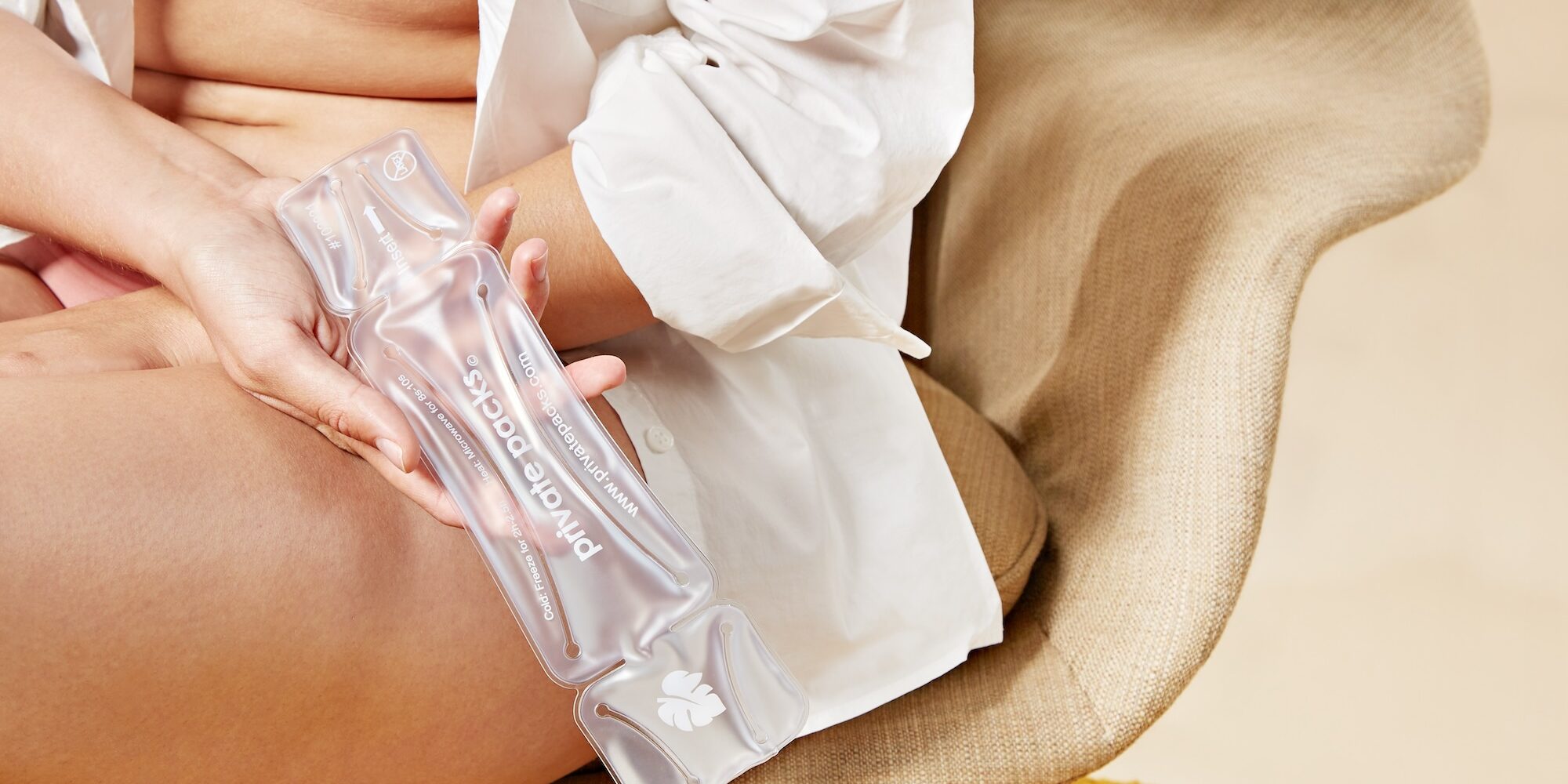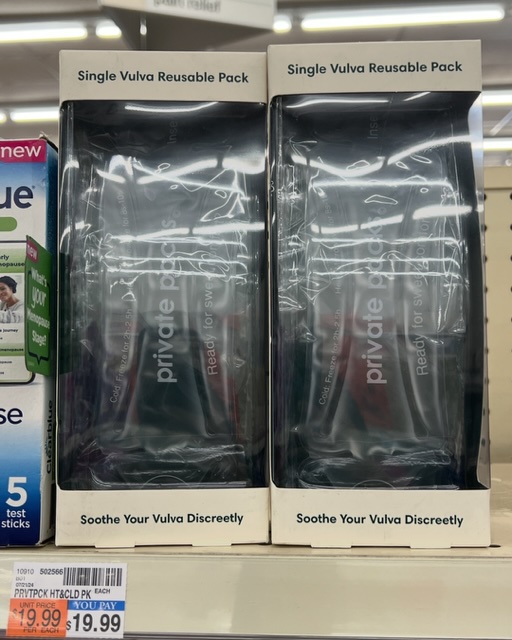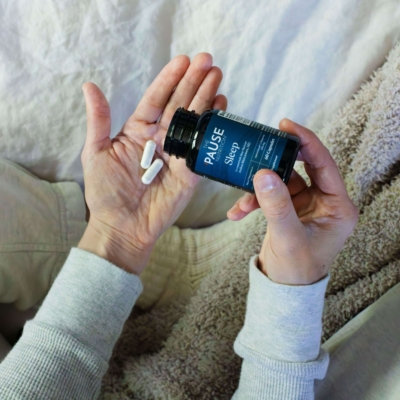
Why This Founder Walked Away From Large-Scale Retail Distribution—And What She’d Do Differently
When founder Suzanne Sinatra saw her brand Private Packs for the last time at CVS, she wasn’t disappointed. “I did not think that I would be this happy that we’re leaving retail, but I’m looking forward to my stress coming down,” she says in a TikTok video posted June 5. “It really took a toll on me, mentally and physically.”
Private Packs’ retail distribution has taken a toll on it financially, too. Sinatra estimates the vulva personal pad brand poured $100,000 into retail partnerships. Private Packs entered eight CVS stores in 2021, the year it launched, and later enlarged its store count to 1,000, and expanded from there to Target, where it was in 250 stores and is sold only online now.
That figure covered the initial inventory for each retailer or what’s called pipe-in, custom packaging for shelves, EDI (electronic data interchange) infrastructure for processing orders, shipping boxes and shipping. “Then, there’s the ongoing cost of keeping shelves stocked because, if you run out, you get penalized,” says Sinatra. “It all adds up quickly.”
Private Packs has raised $352,000 from pitch competitions and an angel round led by friends and family, but hasn’t secured any venture capital. Funding constraints coupled with ongoing fees to stay on shelves and the changing retail landscape, including foot traffic deceleration and reduced in-aisle representation for small, diverse brands, prompted Sinatra to withdraw Private Packs from brick-and-mortar shelves. Now, Private Packs is focused on direct-to-consumer distribution, building its community and releasing new products in e-commerce.
“I spoke to 135 investors, and I didn’t get one. I was already in retail and growing over 50% every year in CVS and in Target, and I was unable to get money,” says Sinatra, adding, “Everyone told me that going to retail first was a huge mistake because it’s very capital intensive, and I blew through a ton of money, but it’s a mistake I never have to make again. I know it’s not for me. It’s not for our brand.”
In greater control of its destiny, Sinatra says Private Packs is going “going full NSFW.” She explains, “There’s a big ass crotch on the top of the webpage that wasn’t there before, and I’m writing the word vagina on my website.” Sinatra notes neither CVS nor Target restricted Private Packs’ language or imagery, but she says she didn’t want to risk “biting the hand that feeds me. Now that I have no one to upset, I’m putting it all out there.”
Below, Sinatra shares the challenges that caused her to pull Private Packs out of retail and the advice she has for other brands looking to get on shelf.
@suzziesinatra I built Private Packs for vulva owners like me. Not to impress investors—but to support bodies that hurt. I’m proud to walk away from retail with my head held up high and into something more honest, sustainable, and me. #fyp #entrepreneur #femalefounder #womenshealth
Think Hard About Expected VElocity
Before Sinatra was scheduled to pitch CVS, she cold emailed The Honey Pot Company co-founder and CEO Beatrice Dixon to solicit advice on Private Packs’ retail pitch. Helping Sinatra on the brand’s pitch deck, Dixon informed her to highlight how it would fit into its category at the retailer. Sinatra created a mock aisle showing Private Packs’ Vulva Personal Pads on shelf next to Azo, Monistat and Replens, which offer vaginal probiotics, vaginal moisturizers and yeast infection treatments.
Sinatra says, “I told them, we don’t belong next to the sanitary napkins, we belong across the aisle, and that’s where we were for four years.”
Private Packs was in a similar location in Target, but it wasn’t to the brand’s advantage. Sinatra breaks down that brands in the feminine care aisle were expected to move four to six units a week. That’s easier to do for disposable period products like pads or tampons, but hard for reusable liners. Sinatra says, “We were performing well, but not well enough for the category.”
In hindsight, placement in an aisle with products like physical therapy packs that had a lower benchmark would’ve been a better fit. Sinatra says, “If you buy one gel pack for your knee, you’re not going to buy another one unless the other knee is bummed out too.”
For founders hoping to get their brands on shelves, Sinatra recommends asking, what aisle you want your brand to be associated with? Understand that an emerging brand will be expected to match that category’s sales velocity. “Velocity is usually not negotiable,” she says. “Every founder should ask that specific question upfront.”
consider Packaging Functionality For stores
In the early days of Private Packs being on store shelves, the brand incurred a lot of damage fees. At first, its pads were housed in a box that customers could touch. They could even pull them out of the box. That proved to be a problem in CVS. In Target, the product was placed in a spring-loaded pusher that would blemish the front part of the box. The issues compelled Sinatra to change Private Packs’ packaging in 2023 to incorporate a plastic shield and more durable material.
She declines to specify exactly how much Private Packs accrued in damage fees, but divulges the amount can range from 100% of the wholesale price to the full suggested retail price, depending on the retailer’s policy. She says, “If a box was mishandled in transit or a unit was damaged by a spring-loaded shelf pusher, that cost is deducted from the amount of the invoice before the payment is sent to the brand.”
The repackaging lowered Private Packs’ damage fees, but Sinatra ultimately decided it wasn’t worth it. “I was at a point breaking even, but when you added on the fees, I was losing money,” she says. “You pay and you learn.”

ALWays TRY TO Negotiate
If Sinatra could have a do-over, she would’ve negotiated aspects of Private Packs’ retail partnerships that were especially challenging. She may have asked for damage fee waivers or reduced shelf fees. She instructs, “At least ask for it, everything is negotiable.”
Sinatra would’ve asked for a list of potential chargebacks as well. “There are so many, and they are often small, but they add up,” she says. “It’s nearly impossible to anticipate them all, and it would have helped to know what to expect instead of finding out after the fact.”
She didn’t negotiate marketing support for Private Packs’ first two years in stores—and she would’ve also tried to secure it if the brand was returning to retail today. Private Packs spread the word about its retail presence most through its social media accounts and influencers that discuss pelvic area pain. Private Packs couldn’t afford to pay for an endcap or in-store flyer advertising for occasions like Breast Cancer Awareness Month and Black History Month.
Sinatra says, “Moments like that mean visibility, and for a small brand, visibility is everything. Eyeballs matter.”
Lastly, she would’ve asked for educational opportunities with staff like pharmacists who could’ve acted as in-store ambassadors. She says, “If someone is picking up a prescription such as Valtrex, Diflucan, Brexafemme, Lidocaine or hydrocortisone, our product could be a helpful complementary solution, but, if the pharmacy staff doesn’t know about us, they can’t recommend us.”
Hire Help
Sinatra has overseen Private Packs’ relationships up and down its supply chain and distribution, inclusive of retail buyers, accounts payable departments and people in the warehouse. Although the brand had a sales broker focused on Target, she admits the load she placed on herself wasn’t sustainable.
“I was doing everything: Hand-packing, managing the retail relationship and trying to market that we were on shelves,” says Sinatra. “I was stuck working in the business instead of on it.”
For brands eyeing retail, Sinatra recommends hiring adequate support. She says, “Being on-shelf is a full-time job, and without support, you can’t give it the attention it deserves.”





Leave a Reply
You must be logged in to post a comment.